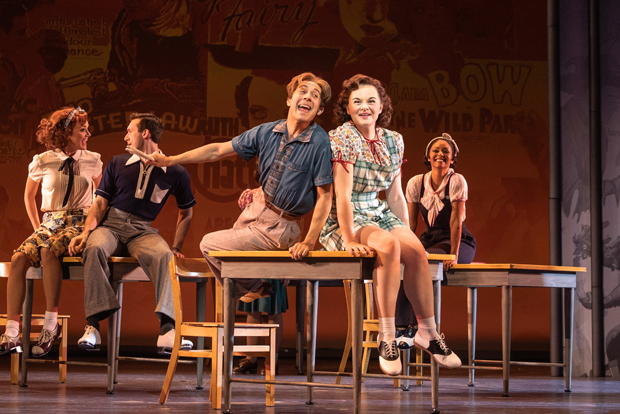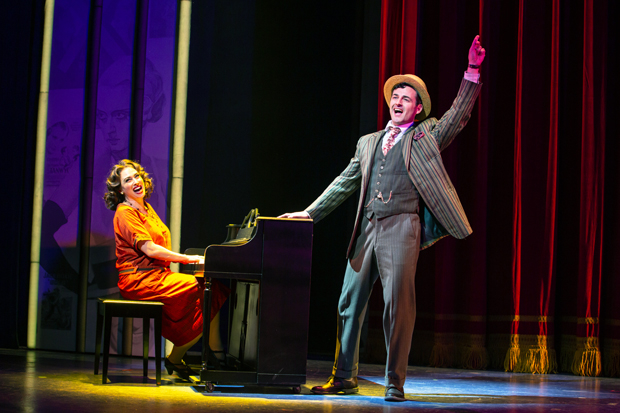Judy Garland Finally Gets a Happy Ending in Chasing Rainbows: The Road to Oz
Garland’s rise to fame as “the girl next door” at MGM is onstage at Paper Mill Playhouse.

(© Evan Zimmerman)
Fame was not always kind to Judy Garland. Renée Zellweger is putting that part of the Golden Age icon's life on display in the new film Judy, with a rendition of "Over the Rainbow" that provides a melancholy reflection on a moment of hope in Garland's budding career as a teen at MGM. Fortuitously or not, that silver-screen reminder of the performer's famously unhappy end is coinciding with Paper Mill Playhouse's production of Chasing Rainbows: The Road to Oz, a chronicle of Garland's early battle with a beauty-centric Hollywood to earn her star-making role as Dorothy in The Wizard of Oz.
It's a triumphant arc in the larger story of Garland (née Frances Gumm), and lends itself to the popular theatrical treatment of a legend's rise to fame against all odds. But knowing how that story continues, a wholly victorious happy-ever-after would be conspicuously inauthentic. These are the choppy waters the show's conceiver (and contributor of additional lyrics) Tina Marie Casamento, book writer Marc Acito, and musical adapter David Libby have to navigate in their buoyant love letter to the little girl with the big voice (a description that befits the musical's star, Ruby Rakos).
The creative team ends up striking a measured balance between the optimistic and the ominous — like Mr. Smith Goes to Washington meets Gypsy. Cheeky humor (often hilariously directed toward Shirley Temple, adorably parodied by Violet Tinnirello) is mixed with dark undertones in an otherwise bubbly song-and-dance musical (with a sparkling set by Alexander Dodge to match). With two-time Tony nominee Denis Jones directing and choreographing with the same old-Hollywood ebullience he brought to Broadway's Holiday Inn, we'd expect nothing less than the entertaining talent showcase he's put together. But those dark undertones — though they do add much-needed shades of color to a musical built around a rainbow metaphor — lead to some confusion about what story we're actually telling.
On one hand, we have a story about the talented Frances Gumm, the youngest of the Gumm Sisters vaudeville act, whose road to a professional career is paved with adults who may not have her best interests at heart. Her mother Ethel (Lesli Margherita, making us wait with baited breath for the day she can play Momma Rose) berates Frances for her weight and makes disgruntled comparisons to the "Beautiful Girls" that fill movie studios. The same comments come from Louis B. Mayer (Stephen DeRosa) at MGM where the teenage singer is given a steady supply of diet pills and remedies for chronic fatigue.

(© Evan Zimmerman)
Her father Frank (Max von Essen showing off his flawless tenor) is painted as Frances's sympathetic salvation whose early death from meningitis leaves his vulnerable daughter without an ally. For most of Act 1, Chasing Rainbows is a story of a formative father-daughter relationship, striking tones of Fun Home with its portrayal of a man struggling with his homosexuality and intermittently serving as a supportive father figure while making a series of dire mistakes (most of them financial in Frank's case).
The specter of Frank occasionally appears in Act 2, but the father-daughter story line for the most part gives way to a new narrative: the freshly dubbed Judy Garland's subversion of Hollywood expectations as the pioneering "girl next door." Her champions in that effort include Mickey Rooney (a perfectly cast and indefatigable Michael Wartella), musician Roger Edens (a heartwarming Colin Hanlon), and Mayer's executive secretary Kay Koverman (Karen Mason, lending her powerful voice to the underappreciated woman who was really running the show #feminism). Like a real-life Dorothy, Tin Man, Lion, and Scarecrow, the four comrades in arms put everything on the line to get Judy to the Emerald City and prove that a regular girl singing "Over the Rainbow" in a barnyard is just the kind of "glamour"
Hollywood is aching for.
Along the way, we're treated to some fabulous Denis Jones dance numbers ("All Ma's Children" and "Got a Pair of New Shoes" are two of the most memorable) and the formidable vocal stylings of Rakos, who blasts classic tunes like "You Made Me Love You," "Zing! Went the Strings of My Heart," and "Swing, Mister Mendelssohn" to the rafters. Her singing gives us all the strength and color we don't get during dialogue scenes when doe-eyed innocence becomes her primary performance quality.
Rakos plays Garland in her early to mid teen years, monochromatically stressing the striking dichotomy between her youthful unworldliness and mature musicality. And yet, she makes some pretty sophisticated observations when she fights MGM over the characterization of Dorothy Gale. Audiences, she chastens the crew of The Wizard of Oz, want to empathize with real people in unglamorous circumstances and inelegant clothing as they overcome life's true heartbreaks. It is truly joyous to see her win that battle. And maybe for a night, we can fool ourselves into believing she won the war.








